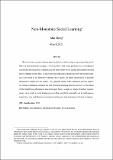Non-monotone social learning
Abstract
We revisit the canonical binary-state model of social learning to investigate the possibility of non-monotone learning: ceteris paribus, with some predecessor(s) switching to actions that reveal greater confidence in one state of the world, agents nevertheless become more confident in the other. A necessary and sufficient condition for non-monotone learning is provided in an illustrative setting where agents are either uninformed or partially informed by binary private signals. In a general setting with continuous private signals, we obtain a sufficient condition for non-monotone learning that does not rely on the shape of the underlying information structures apart from a couple of simple boundary requirements. As a result, a social learning process that completes eventually can be well approximated in a way such that non-monotone learning and anti-imitation are bound to happen.
Citation
Zhang , M 2021 , ' Non-monotone social learning ' , Journal of Economic Behavior and Organization , vol. 185 , pp. 565-579 . https://doi.org/10.1016/j.jebo.2021.03.009
Publication
Journal of Economic Behavior and Organization
Status
Peer reviewed
ISSN
0167-2681Type
Journal article
Collections
Items in the St Andrews Research Repository are protected by copyright, with all rights reserved, unless otherwise indicated.

